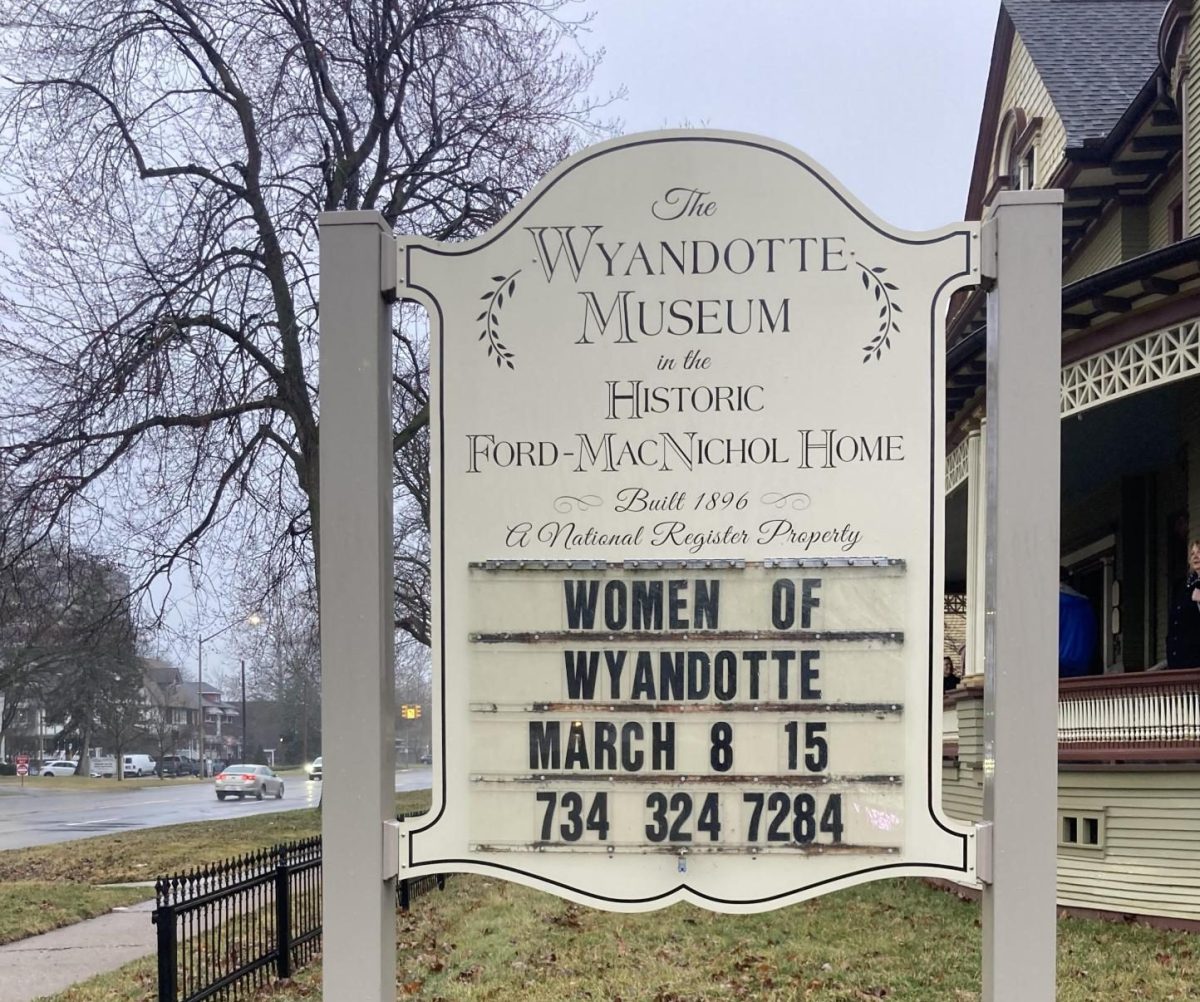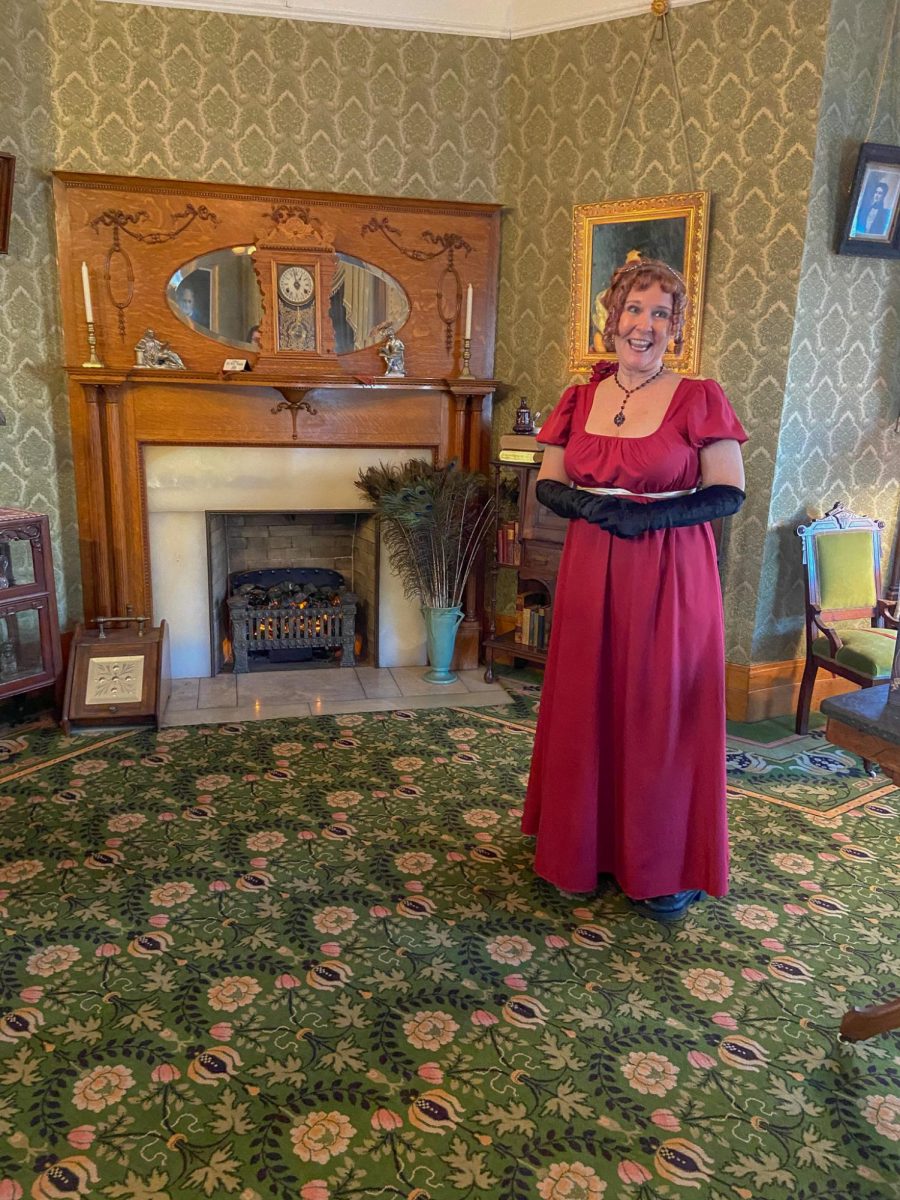The Wyandotte Historical Society shared the stories of prominent local women—Eliza Biddle, Lisette Denison Forth, Ellen Folger Van Alstyne, and Ella Clark Bishop—at their annual Women of Wyandotte performances supporting Women’s History Month. The community gathered at the event in remembrance of these women who defined the course of their history.
After registering in advance and paying a $5 fee, attendees were directed through the historic Ford-MacNichol House, located at 2610 Biddle Avenue in Wyandotte. Each woman was in a different room of the home and guests progressed through the three-floor house, stopping to hear each of their stories as they ascended.
Eliza Falconer Bradish Biddle spoke to guests first. Wife of Major John Biddle, her family’s estate was responsible for the city’s name; the Biddles purchased a large plot of rural land and named their grand estate “Wyandotte” after the native tribe who originally resided on the land. While her family only lived on the land for 10 years, her work building the city’s foundation continues to show with the name alone.
Elizabeth, Lisette, Denison Forth’s story was told next by a fictional descendant. A formerly enslaved woman, Mrs. Denison Forth fought for her freedom but was denied, so she and her family escaped to Ontario, Canada via the Underground Railroad. She returned to Wyandotte, emancipated, after the War of 1812 and would work for prominent families like the Biddles; Mrs. Biddle credited Mrs. Denison greatly for her family’s success. However, she is remembered for her savvy business ventures, being the first African American woman to own land in Michigan. With the wealth she accumulated during her life, Mrs. Denison built St. James Episcopal Church, whose doors remain open to all on Grosse Ile at 25150 East River Road.
The performances moved upstairs to an elaborate pink bedroom where Ellen Folger Van Alstyne revealed the everlasting values she instilled in the community. Mrs. Van Alstyne was the wife of Wyandotte’s first mayor, John Schemerhorn Van Alstyne. As the First Lady, Mrs. Van Alstyne was committed to developing the city, which she did through the creation of the Tuesday Study Club. Her husband prompted the club intending for the women to beautify the city, but the civic organization did far more; with a dedication to philanthropy, education, society, culture, and medicine, the club made strides in reducing clutter by campaigning for public trash cans, and increasing public safety by retiming the traffic lights so that pedestrians could safely cross the street. Most importantly, Mrs. Van Alstyne established Wyandotte’s first hospital and sat on the Wyandotte municipal hospital as the first president of the board. She valued recreation as well, assembling the first high school girls’ basketball team.
There was a brief divulgence from these foundational women when attendees were directed to a children’s room, where a guide would talk about Wyandotte’s another type of influential woman: the business owner. The women recognized for their roles as store owners were Minnie Armstrong, Esther A. Bowles, Clotilda (Tillie) Hoersch, and Cecilia Melody whose storefront is still beloved as Cecilia Melody’s at 2955 Biddle Ave, Wyandotte.
Archery champion and 1959 Miss Michigan winner Ann Marston was highlighted as well. Marston, while born in England, grew up in Wyandotte and rose as a local celebrity for her immense archery talent and beauty pageant success. Her early death at 32 from Type 1 diabetes remains a tragedy, but the Wyandotte Historical Society did not allow for her life to be forgotten.
The tour ended with Eleanora Matilda “Ella” Clark Bishop in the home’s highest room, which was filled with historic pieces and short writings to deepen the attendees’ understanding of Wyandotte’s history. Mrs. Bishop was a staunch advocate for women’s rights and was involved in promoting suffrage as well as the establishment of the Tuesday Study Club alongside Mrs. Van Alstyne. She also aided in the creation of the Gateway Garden Club, planting trees that continue to thrive today. She was also key in establishing the First Congregational Church of Wyandotte—the church is still active at 98 Superior Blvd. Her philanthropy is integral to Wyandotte’s city culture of the past and the present.
The passion of the actresses brought history to life and by having them speak directly to the audience, attendees became engaged with the past. Their liveliness and knowledge of the women’s lives are remarkable, making the performances a definitive success.
The importance of local history cannot be understated, especially regarding larger movements like women’s history. Events such as this one unite the community in recognizing women responsible for the life they currently live; the Wyandotte Historical Society shines the light on their contributions integral to shaping Wyandotte’s legacy.





